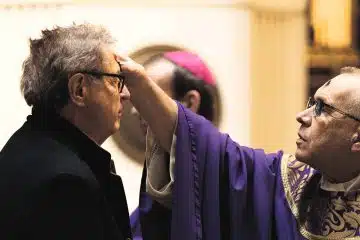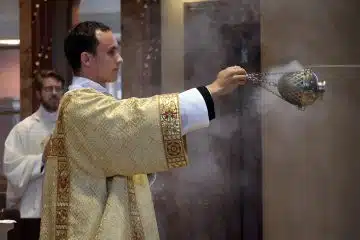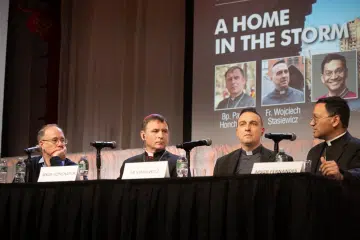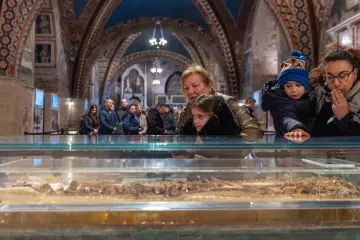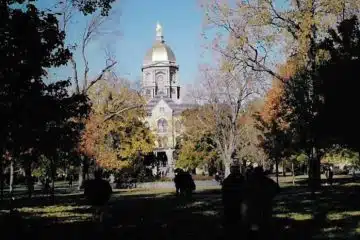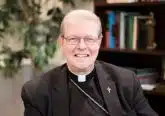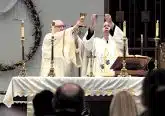A Priest’s Perspective: FAMILIES OF PARISHES: DISCERNMENT AND CO-RESPONSIBILITY
This article is part of a series from Father Earl Fernandes exploring Families of Parishes. Click the links below to find other articles in the series.
The Church as the Family of God
Families of Parishes as Evangelizing Communities
Being a Synodal Church
Synodality Walking with Christ, The Holy Spirit and the Virgin Mary
Synodality in the Church of the Church
The road that lies ahead for the Archdiocese of Cincinnati with Beacons of Light will not be an easy one. It will require discernment at both an individual and communal level. In The Joy of the Gospel, Pope Francis invites every local church to enter into a resolute process of discernment, purification and reform so that the Church’s missionary impulse might be more focused, generous and fruitful, adding that it is important “to not walk alone, but to rely on each other as brothers and sisters, and especially under the leadership of the bishops, in a wise and realistic pastoral discernment” (Evangelii Gaudium, 30; 33).
Three phrases that help us understand discernment are: to recognize; to interpret; and to choose.
TO RECOGNIZE.
Individuals and Families of Parishes must possess a sense of self-awareness to help recognize, name and confront situations and difficulties in life. Many today may be well-educated in general, but illiterate when it comes to affectivity. Hence, there is a serious need to form people and communities to honestly assess one’s own identity and to recognize the Spirit’s interior movements, particularly those which bring joy and those which last.
TO INTERPRET.
Individuals and Families of Parishes must not only recognize challenges, but also learn to interpret experiences, especially in the light of faith. As individuals and communities attempt to understand their experiences’ meaning and how to evaluate them, the Catholic faith’s hierarchy of truths assists in the discernment process.
Pope Francis, in Evangelii Gaudium, calls all of us to discern: “Each Christian and every community must discern the path that the Lord points out, but all of us are asked to obey His call to go forth from our own comfort zone in order to reach all the ‘peripheries’ in need of the light of the Gospel” (EG, 20).
The process of discernment and deliberation is critical. People and parishes need to use both faith and reason to weigh the pros and cons in proposals and decisions. Laity are called to fulfill their baptismal responsibilities by working for the world’s sanctification and engaging in the Church’s evangelizing mission, offering insights from their professional, personal and spiritual experiences.
Religious men and women are uniquely positioned to illuminate some issues’ transcendent and eschatological dimensions. As co-workers with the bishop and priests, especially pastors, they can offer their theological, spiritual and pastoral wisdom, applying their experience of shepherding and accompanying the flock and standing as Christ in their midst.
TO CHOOSE.
Discernment demands being able to choose. Mindful of their duty to listen to the flock, pastors must have “the smell of the sheep.” The archbishop has a personal and specific responsibility locally to witness to the truth and preserve both the unity and integrity of the faith and of his flock. Ultimately, the archbishop bears the final responsibility for canonical decisions; however, his choices flow from, and come only after, the laity and clergy’s consensus and his own prayerful discernment.
For example, in the Beacons of Light process, the groupings into Families of Parishes required gathering insights and data from lay men and women, pastors, pastoral councils and staff, then collaborating on possible groupings. Further input was sought from the deans, Presbyteral Council and heads of archdiocesan departments, along with priests and school principals. After a three-week public comment period, a consensus for final groupings emerged to which the archbishop consented. Later, each Family of Parishes will propose its own pastoral plan and submit it to the archbishop for his consent.
This consent – this choosing – is never an assertion of power but remains a service to the Church in the name of the Lord Jesus. Fundamentally, discernment is of a communitarian nature that expresses the co-responsibility believers have; it demands that its members have an ecclesial conscience leading to communion. The keyword is “co- responsibility.”
In 2009, Pope Benedict XVI said: “It is necessary to improve pastoral structures in such a way that the co-responsibility of all the members of the People of God in their entirety is gradually promoted, with respect for vocations and for the respective roles of the consecrated and of lay people. This demands a change in mindset, particularly concerning lay people. They must no longer be viewed as ‘collaborators’ of the clergy but truly be recognized as ‘co-responsible,’ for the Church’s being and action, thereby fostering the consolidation of a mature and committed laity” (Benedict XVI, “Discorso all’apertura del convegno pastorale della diocesi di Roma sul tema: ‘appartenenza ecclesiale e corresponsibilità pastorale,’” May 26, 2009).
Decisions and choices must be made that likely will not be easy. All involved are expected to experience some pain, but if it is a shared process, our local church will be better positioned to carry out the mission of evangelization and our parishes will truly be Beacons of Light.
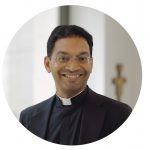 Father Earl Fernandes is the pastor of St. Ignatius of Loyola Church in Cincinnati and holds a doctorate in moral theology from the Alphonsian Academy in Rome.
Father Earl Fernandes is the pastor of St. Ignatius of Loyola Church in Cincinnati and holds a doctorate in moral theology from the Alphonsian Academy in Rome.
This article appeared in the January 2022 edition of The Catholic Telegraph Magazine. For your complimentary subscription, click here.



